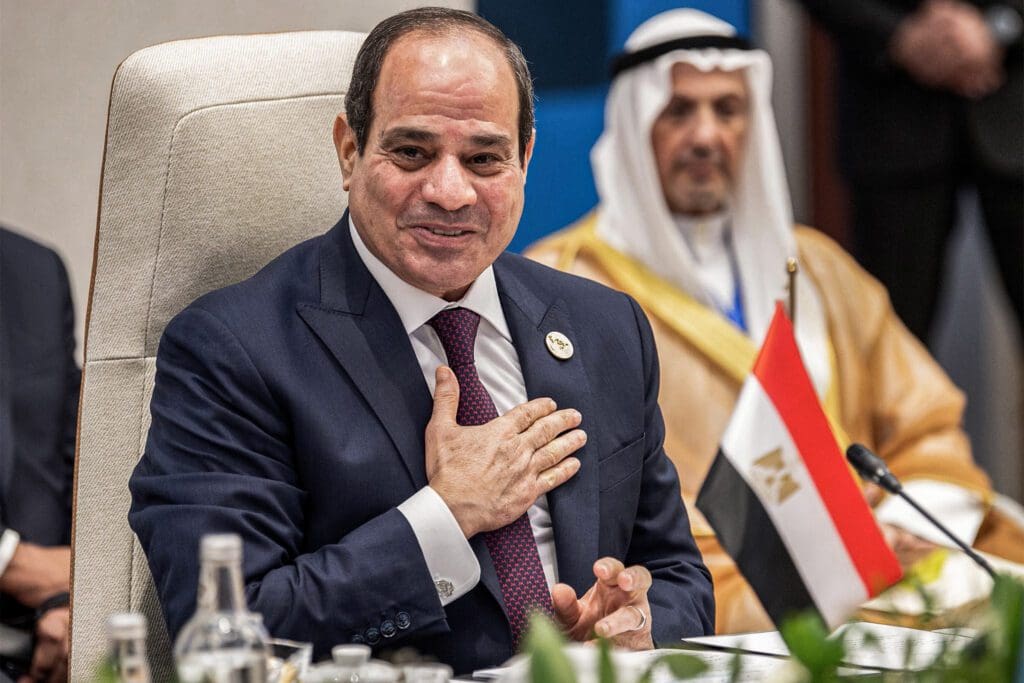Speculation has been growing in recent months that Egypt and Iran could be close to putting decades of mutual antagonism behind them. In early May, Egyptian and Iraqi officials said talks were underway in Baghdad with a view to mending relations between the two major regional powers. Later that month, Supreme Leader Ayatollah Ali Khamenei said that Tehran would welcome better ties with Cairo.
Khamenei was speaking in Oman, which has often mediated in Gulf disputes and played a key role in the March 2023 rapprochement between Iran and one of Egypt’s closest allies, Saudi Arabia. That agreement and subsequent moves towards de-escalation across one of the region’s major fault-lines appears to have pulled Cairo closer to mending its own ties with Tehran. A thaw in the relationship between the two most populous nations in the Middle East could mark a major shift. However, considerable obstacles stand in the way of truly warm ties.
Egyptian-Iranian relations have been fraught for decades. After the death of Egypt’s Gamal Abdel Nasser in 1972, a short period of relative amity ensued. His successor, Anwar Sadat, abandoned Nasser’s pan-Arabism and steered the country into the Western orbit, which meshed with the Shah of Iran’s pro-Western outlook. However, in 1979, the dynamic changed dramatically. The Shah was overthrown and fled to Egypt, leading to the severing of diplomatic ties the following year. Just two months after the Shah’s fall, Sadat signed a peace treaty with Israel, pitting him against the new regime in Tehran. To make matters worse, when Iran went to war with Iraq in 1980, Egypt sent arms to Baghdad, partly as a means to ease its way back into Arab sympathies after the Camp David accords. The move also underscored the strategic importance of Egypt’s ties with the Arab Gulf monarchies, which were deeply troubled by the Iranian revolution and the potential that it could spark uprisings against their own regimes.
President Sadat’s assassination by Islamist militants during a military parade in Cairo in 1981 was greeted with jubilation in Iran. The government named a major street in Tehran after Khalid Islambouli, an Egyptian army officer who had planned and participated in the attack. In 1987, after Egyptian security officials arrested 37 members of a radical Muslim fundamentalist organization reportedly financed by Iran, Egypt announced it was breaking all remaining diplomatic ties with Iran, shutting down the tiny surviving Iranian representation in Cairo and recalling Egypt’s single diplomat from Tehran. It was not until Iranian President Mohammad Khatami visited Egypt in 2004 that the dispute over the street name was resolved and cool diplomatic ties were restored.
In the wake of the Arab uprisings of 2011, the senior Muslim Brotherhood official Mohammed Morsi was elected Egypt’s first post-revolution president. The relationship again thawed: Iran appointed an ambassador to Egypt and President Morsi travelled to Tehran in 2012 for Non-Aligned Movement meetings. Iranian President Mahmoud Ahmadinejad made a similarly historic trip to Cairo in 2013 in the hope of establishing a new post-sectarian “resistance axis” with Egypt. Later that year, however, the dynamic once again swung dramatically back toward hostility, as the Egyptian military overthrew Morsi—a move officially condemned by Iran.
Even in 2015, when Iran and the P5+1 group of mostly Western powers signed a deal over Iran’s nuclear program, it did not appear that Egyptian-Iranian ties would be fundamentally re-orientated because it did not affect the dominant driver in the relationship, namely Egypt’s alignment with the Arab Gulf monarchies. It is important to bear in mind that Saudi Arabia and the United Arab Emirates have been vital sources of finance for Egypt’s beleaguered economy post-2013. Still, low level relations were maintained in 2016 even after Saudi Arabia and others cut ties with Iran over the storming of the Saudi embassy in Tehran.
The Saudi–Iranian normalization agreement has since turned the Arab Gulf-led premise on its head, tabling the possibility of further de-escalation in the region and even enhanced security ties between Iran, the UAE and Saudi Arabia. However, several factors make it unlikely that Egypt will go as far or as quickly in courting Iran as its Gulf allies have. Egypt-Iran normalization remains rooted in political-ideological and geostrategic issues, with an emphasis on Egyptian, Israeli, Iranian and Arab Gulf threat perception, as well as calculations about how any deal could affect Egypt’s status in the ever-shifting regional balance of power. Moreover, ideological discord between the two governments remains, underscored by the legacy of Iran’s support for the Muslim Brotherhood after the Arab Spring.
So too does Egypt’s decades-long coordination with Iran’s arch enemies, Israel and the U.S. make it unlikely that any Egypt–Iran security relations will develop in the foreseeable future, especially without the heightened sense of insecurity felt by Egypt’s Gulf partners. Given the high stakes versus possible returns, Cairo is bound to tread carefully in this regard. Were the U.S. itself to reach a deal with Iran, that could give Egypt more incentives to strike its own agreement with Tehran. But other risks, such as an escalation between Israel and Iran, could easily scupper it.
The Abraham Accords and wider range of Arab states engaging with Israel through the Negev Forum Working Groups, including the UAE and Egypt, show that Egypt is tied into a variety of regional frameworks. This reflects Egypt’s core interest of ensuring stability on its border and continuing to leverage its influence over Palestinian militants in Gaza in its dealings with the U.S. Egypt has been keen to calibrate its leverage in the Israel-Palestine conflict in part to maximize its regional status and U.S. military assistance.
Iran has stepped up its efforts to expand its regional influence following the 2011 Arab uprisings, generally targeting the interests of Sunni monarchies Saudi Arabia and the UAE, which in turn have waged a years-long war in Yemen against Iran-aligned Houthi rebels. Both states have suffered from Houthi and Iranian attacks on their homelands. That includes the damaging 2019 attacks on Saudi oil installations at Abqaiq and Khurais and the failure of the U.S. to provide immediate assistance, which was arguably a major contributing factor behind Saudi diplomatic engagement with Iran. Indeed, by restoring ties with erstwhile adversaries in the Arab world, Iran is able to drive a wedge between those states contemplating normalization with Israel and the U.S.-Israeli effort to isolate Iran through a regional coalition. However, the nature and duration of Egypt’s peace agreement with Israel puts it in a different category.
On the socioeconomic side, Egypt and Iran have a common interest in boosting their trading relations. But it is difficult to see any major trade deals occurring due to their similar economic orientation. Egypt is driven by gas extraction, communications, agriculture and construction, and Iran is focused on hydrocarbons, agricultural and service sectors. Both states are struggling with economic crises which could fuel dissent and further political crises. Egypt could potentially be swayed into a deal through Iranian investments into its economy, possibly through intermediaries such as Russia, China, or Qatar. But as it buckles under sanctions, Iran has few resources to invest. There may be more potential in tourism, which would bring much needed hard currency into Egypt.
An Egyptian–Iranian normalization deal would be significant, but currently follows the simple logic and trend of regional de-escalation. For such a deal to be more meaningful, it would require far greater collaboration on a host of regional security issues, including Yemen, Lebanon and Syria, where Egypt shares similar interests to Saudi Arabia and the UAE.
With decades of distrust, competition and unresolved tensions, questions remain over how sustainable the new push for de-escalation and normalization of Egyptian–Iranian relations will be, especially if there is further deterioration in U.S.-Iran, Saudi-Iran, or Israeli-Iran relations.
The opinions expressed in this article are those of the author and do not necessarily reflect the views of the Middle East Council on Global Affairs.


